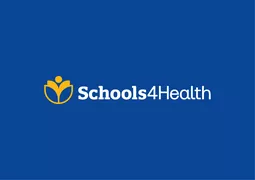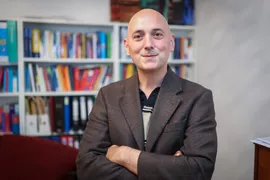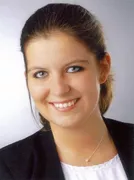The education system is facing significant challenges across Europe. Be it stress, nutrition, or physical activity. The list of necessary changes for children and young people in everyday school life is long. Added to this are problem areas such as teacher shortages and aging schools. The Europe-wide "Schools4Health" project aims to introduce, strengthen, and sustainably establish a sustainable participatory overall approach to "health-promoting schools."
Prof. Dr. Orkan Okan, Head of the Assistant Professorship of Health Literacy, and Research Associates Denise Renninger and Torsten Bollweg are supporting the project, which is funded by the EU Commission, by conducting an internal evaluation of the project and various best practices in the participating countries and corresponding schools. They also provide advice on realization and help implement the participatory approach. The joint project is being funded with a total of 1,372,048.74 euros.
"In the Schools4Health project, we were analyzing the WHO's "Health Promoting School approach" in schools in selected European countries. With our recommendations for action, we want to help schools throughout Europe to develop into health-promoting or healthy schools," explains Prof. Okan.
Schools4Health particularly emphasizes the collaboration between different areas, such as the education and health sectors, to create a "health-promoting school" together with pupils, teachers, school staff, parents and other stakeholders. Three main areas are covered:
"Practice" includes implementation of "best practice" examples, which are collected on the project's official website, presented in various categories and made available to all participating schools.
"Policy" covers the cooperation between the various stakeholders.
"Engagement" refers to the online information campaign on the “Health Promoting School approach”, the policy briefs, and the guidelines for health professionals.
Regarding realization and implementation, schools have a high degree of flexibility depending on available resources. Examples of this would be the provision of healthy eating habits through balanced meals in the canteen and the integration of regular exercise and physical activity into everyday school life.
In the long term, the program aims to develop a high level of health literacy for a self-determined and healthier life. The ability to find and understand health information and integrate it into everyday life is a central component of the educational program to make informed decisions about one's health. "With the project, we not only want to tackle health and health literacy, but also focus on a long-term ‘triple-win’ for the school community, which includes positive educational outcomes, sustainable environments, and equal opportunities," explains Research Associate Denise Renninger.
Under the leadership of EuroHealthNet, 13 consortium partners from ten different countries (Belgium, Denmark, Netherlands, Germany, Greece, Hungary, Latvia, Romania, Slovenia, and Spain) are participating in the project, which will run for four years. Other partners include public health institutes, departments as well as international networks such as the Schools for Health in Europe Network Foundation, the UNESCO Chair Global Health and Education, and the International Sport and Culture Association.
"As external evaluators of the entire joint project, we have a special role to play, as we are not directly concerned with the implementation of the various interventions in the schools, but rather at the big picture: what contribution does the overall Schools4Health project make to schools becoming health-promoting environments for young people?", concludes Torsten Bollweg, emphasizing the added value of the project for society.
To the homepage of the Assistant Professorship of Health Literacy
To the homepage of the "Schools4Health" project page
To the joint project "Schools4Health"
Contact:
Prof. Dr. Orkan Okan
Assistant Professorship of Health Literacy
Georg-Brauchle-Ring 60/62
80992 Munich
phone: 089 289 24986
e-mail: Orkan.Okan(at)tum.de / info.healthliteracy(at)tum.de
Denise Renninger
Assistant Professorship of Health Literacy
Georg-Brauchle-Ring 60/62
80992 Munich
phone: 089 289 24686
e-mail: Denise.Renninger(at)tum.de
Torsten Bollweg
Assistant Professorship of Health Literacy
Georg-Brauchle-Ring 60/62
80992 Munich
e-Mail: Torsten.bollweg(at)tum.de
Text: Bastian Daneyko
Photos: private



